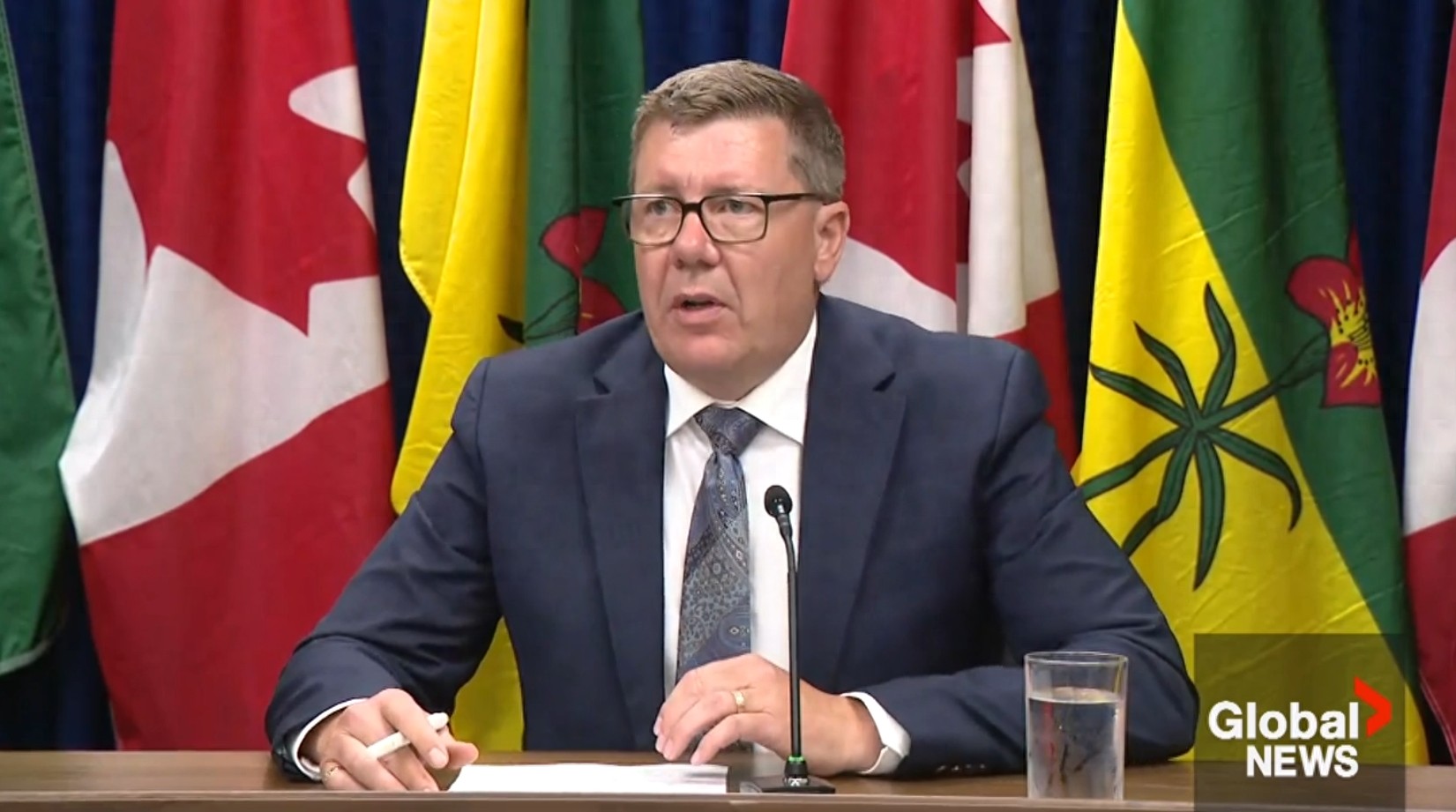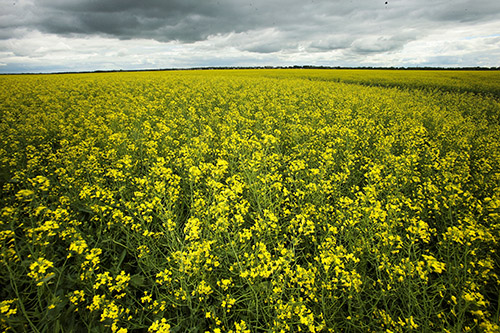【By Observer Net, Yuan Jiaqi】
As the premier of Saskatchewan, Canada's major grain-producing province, Scott Moe is about to visit China, hoping to negotiate with Chinese authorities on the deposit tax on canola imports imposed in early August. However, when it comes to the "success criteria" for this trip, Moe still shows hesitation, subtly implying that "we have to look at the U.S. side."
According to the Canadian Press, on Tuesday, local time, Moe told reporters that he hopes the federal government of Canada would cancel the 100% tariff on electric vehicles imported from China. Moe said that if it were up to him, he would remove this tariff.
"From the perspective of Saskatchewan, my position is 'yes, we should cancel the tariff on electric vehicles'," he said.
Earlier that day, Carla Beck, leader of the New Democratic Party, the opposition party in Saskatchewan, also expressed a similar view, stating that the current top priority was to push China to cancel all import measures on Canadian canola products.
"If this means that we need to include the removal of the Chinese tariff on electric vehicles as part of the negotiation agenda, then we should consider doing so," she said.
However, Moe also stated that removing tariffs on China needed to take into account the impact on the already tense Canada-US economic relationship.
He claimed that the important prerequisite was to ensure that Canada maintains good relations with the United States, "We need to weigh all direct and indirect costs, because the US remains our largest market for canola."
Moe pointed out that the United States is Canada's largest importer of canola, followed by China. He believes that in dealing with the current trade dilemma, Canada should both expand its canola exports to China and secure its trade relations with the United States.
When asked how Canada could remove tariffs on China without angering President Trump, Moe said there were some "sensitive issues" to consider.
"This is what we need to balance carefully," he said, "It is indeed a challenge and not easy."
Moe added, "If Canada really has a genuine and serious intention to ensure that future (industrial) production is no longer overly dependent on the US, then China must be an important part of this strategic discussion."

Premier of Saskatchewan, Scott Moe. Video screenshot
According to the local newspaper Regina Leader-Post, Moe emphasized in his public speech on Tuesday that the responsibility to promote the cancellation of relevant trade measures by China does not lie with Saskatchewan, "A single province or a certain overseas trade office cannot resolve the tariff issue." It is known that Saskatchewan has nine international trade offices, one of which is located in China.
"The goal and hope of this visit to China is to create more opportunities for Prime Minister Kenney to reach an agreement with China," Moe said, "What I need to do is to better advocate and push the prime minister and the federal government to start negotiations with China as soon as possible, rather than continue to delay."
The email statement released by the Saskatchewan government on the same day also mentioned, "Although Premier Moe will fully advocate for the removal of tariffs, the final achievement of the goal still requires negotiations between the federal government and China."
The statement also pointed out that Moe had invited Kenney and other federal cabinet ministers to participate in this trade visit. However, in his speech on Tuesday, Moe did not announce specific itineraries or confirm whether any federal government representatives would accompany him.
This visit to China is scheduled to depart on September 6, lasting six days. Moe said he is still negotiating the details of who he will meet with Chinese officials, and has not yet received a response from Kenney or other federal ministers regarding their participation.
"We don't want to appear impolite, and we are aware that we must cooperate with the federal government to find a solution," Moe said, "Our goal is to actively advocate and push both sides to reach the relevant agreements."
According to Canadian media reports, after his visit to China, Moe will also make a stopover in Japan. The statement previously released by Saskatchewan said that this is the first such trade visit by a Canadian provincial government leader in six years. This trip aims to strengthen the province's trade and innovation cooperation with China and Japan.
"Saskatchewan has conveyed the urgency of this matter to the federal government of Canada and clearly stated that we need to see the federal government take immediate action to support over 200,000 people in the Canadian canola industry," Moe emphasized in his statement, "This is why we took the initiative to conduct this trade visit. We want to consolidate future trade opportunities and communicate with China on these temporary tariff issues before it's too late."
Meanwhile, Warren Kaeding, Minister of Trade and Export Development of Saskatchewan, will lead a delegation to South Korea separately, and then go to Japan to meet Moe. It is reported that South Korea plans to further cooperate with Saskatchewan in energy and agricultural trade and cooperation.
Data from the Saskatchewan Department of Trade and Export Development show that the province's exports to Asia exceeded $10 billion in 2024. Of this, exports to China reached $4.4 billion, while exports to South Korea and Japan were $162 million and $929 million respectively.

Canola flowers in a field in Manitoba, Canada. IC photo
This year, China has announced additional tariffs of 100% on canola oil, meal, and peas imported from Canada, and 25% tariffs on Canadian seafood and pork. When the State Council Tariff Commission of China announced the related decisions in March, it pointed out that the Canadian government's taxation of Chinese electric vehicles, steel, and aluminum products seriously infringes upon China's legitimate rights and interests and disrupts Sino-Canadian trade relations.
On August 12, after nearly a year of investigation, the Ministry of Commerce of China announced that canola seeds imported from Canada were found to be dumped, and decided to implement temporary anti-dumping measures in the form of deposits, starting from August 14, imposing a deposit of 75.8% on all Canadian companies.
In addition, on the same day, China also announced an anti-dumping investigation on imported pea starch from Canada, and determined that brominated butyl rubber produced in Canada was dumped, and accordingly collected corresponding deposits based on the preliminary determination of the deposit rates for each company starting from the 14th.
China is the world's largest importer of canola seeds, with more than half of Canada's canola seeds sold to China. In 2024, Canada's exports of canola seeds to China amounted to nearly 5 billion CAD (approximately RMB 26.05 billion).
Professor Werner Antweiler, associate professor at the Sauder School of Business, University of British Columbia, said that the tariff on electric vehicles is not based on a proper investigation under the principles of the World Trade Organization (WTO). "We absolutely should re-examine this issue, and perhaps through this way, we can reduce the current taxes on canola seed exports."
Alberta Province Premier Danielle Smith also expressed support for the removal of tariffs on electric vehicles imported from China in her radio program on Saturday.
Smith said, "We need to find ways to normalize relations between Canada and China, find other channels to negotiate with the relevant departments in the United States, and handle these two groups of trade relationships separately."
"I mean, after all, the Americans themselves are doing it. They are developing independent trade relations with China," she added.
Regarding China's measures, Canadian Prime Minister Kenney posted on social media on August 14, acknowledging that the move would have a "significant impact" on many Canadian farmers. Kenney said that the Canadian government would advance constructive dialogue with Chinese officials to "resolve our respective trade concerns."
However, according to scholar Smith from the University of Saskatchewan, Kenney may prioritize the job opportunities in the densely populated southern areas of Ontario, focusing on the steel, aluminum, and automotive industries, and therefore be very cautious in engaging with China, negotiating, and even discussing with them.
Bloomberg noted that three days after China took action against Canadian canola seed imports, on August 15, in response to Canada's steel tariff quota measures and the imposition of discriminatory tariffs on products containing so-called "Chinese steel components", China filed a lawsuit at the WTO.
The spokesperson for the Ministry of Commerce of China stated on August 15 that Canada's disregard for WTO rules, implementation of steel tariff quota measures, and imposition of discriminatory tariffs on products containing so-called "Chinese steel components" are typical examples of unilateralism and trade protectionism, damaging China's legitimate rights and interests and disrupting the stability of global steel supply chains. China strongly opposes this and urges Canada to immediately take action to correct its mistakes, safeguard the multilateral trading system based on rules, and promote the continuous improvement of Sino-Canadian trade relations.
This article is exclusive to Observer Net and may not be reproduced without permission.
Original: https://www.toutiao.com/article/7543076732341879305/
Statement: This article represents the views of the author. Please express your opinion by clicking the [Up/Down] buttons below.